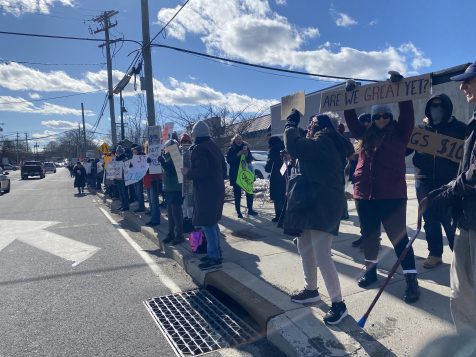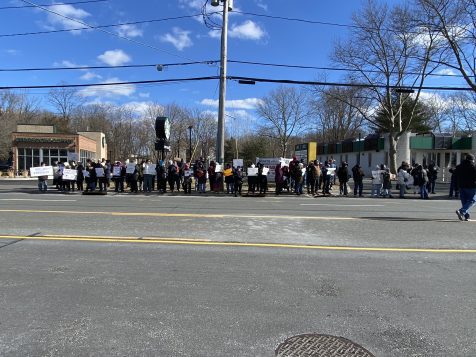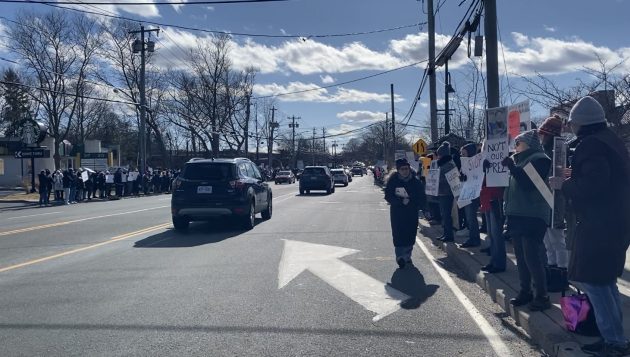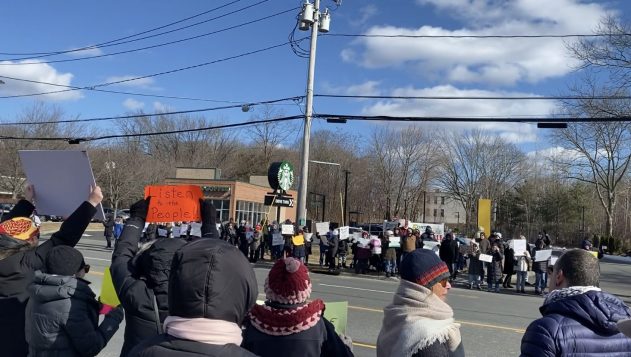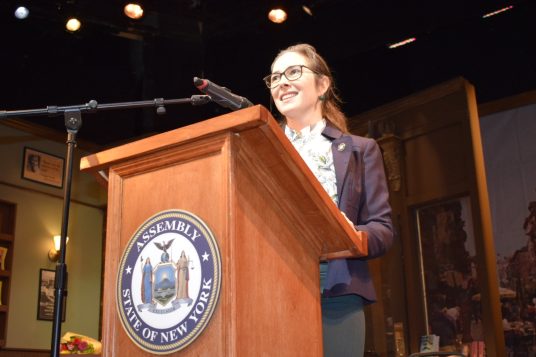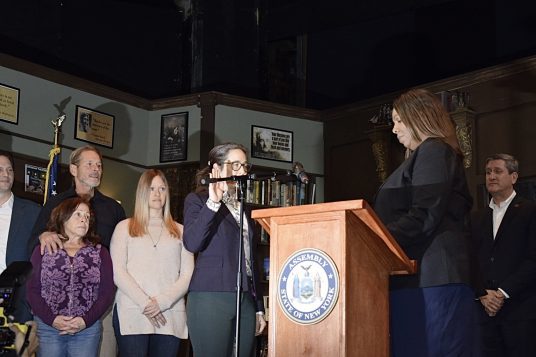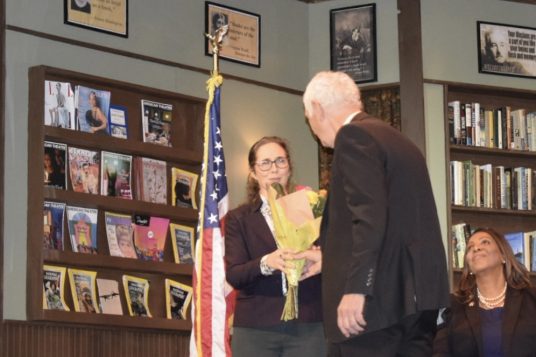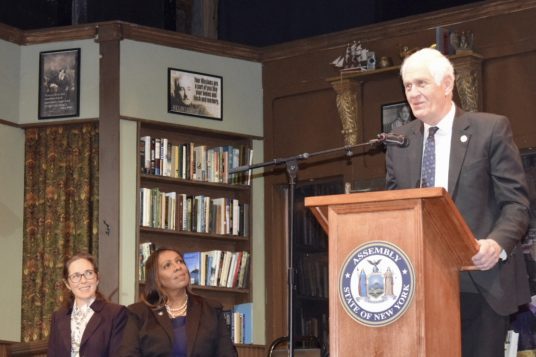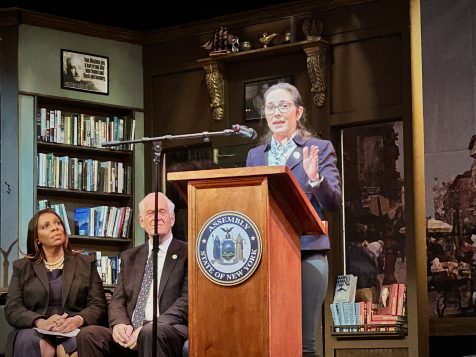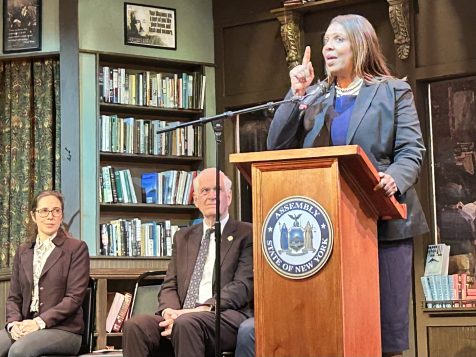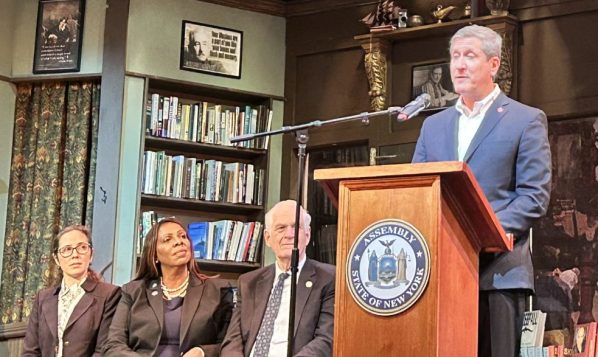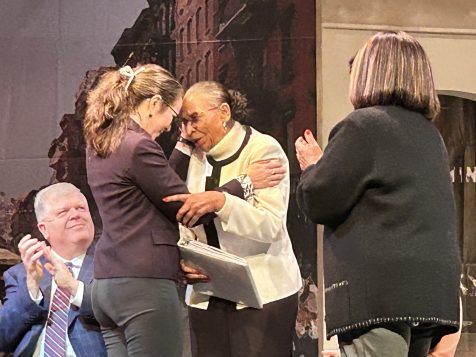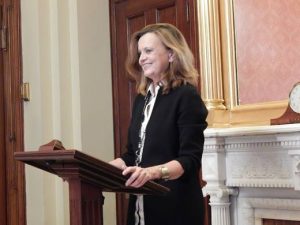By William Stieglitz
On Saturday, March 1, Long Islanders lined the sidewalk outside the Tesla Showroom in Smithtown to express their grievances with Elon Musk, the Tesla CEO who simultaneously oversees the Department of Government Efficiency established by President Donald Trump (R) this year. Protesters stretching a quarter mile down Smithtown Bypass held signs expressing concerns over corruption and the endangerment of democracy.
The rally was part of the nationwide Tesla Takedown movement, which has spawned a multitude of protests since mid-February. More than 50 happened Saturday, March 1, alone, with the protests encouraging people to “sell your Teslas, dump your stock, [and] join the picket lines” in order to strike back financially against Musk. With Tesla stocks having fallen 28% last month, organizers believe it to be working. Many of these protests were also part of the nationwide Indivisible organization.
The Smithtown rally was organized by the newly created United Voices for Freedom, which describes itself as “a grassroots group that serves to amplify progressive voices in the northern central region of Long Island.” Tiffany, who founded the group and wanted her last name kept private, said, “We’re all worried about the overreach of Musk and his ransacking of our federal agencies. No one elected Musk.” The concern of Musk being “unelected” was repeated by nearly every attendee interviewed, each having a wide range of grievances regarding the billionaire.
“He has a tremendous conflict of interest,” said Deborah Roberts, an attendee who previously organized a rally for congressional town halls. “He just ended the Verizon contract and put Starlink in, he controls communications and platforms online… he’s interfering in our economy and ruining our guardrails for safety in this country, but he’s not chipping away at his welfare program for Starlink and for SpaceX. And not only that, he’s dismantling bureaucracies that have oversight for both of those programs. He doesn’t want anyone looking.”
Roberts spoke too on concerns of Musk operating within the executive branch while neither having been vetted by Congress nor having divested himself of personal financial interest. His accessing of Americans’ private information was something many there found especially dangerous. “If you wanted a template for corruption,” said attendee Paula Fries, “this is it.”
Others elaborated on issues of what DOGE is cutting, expressing fear for Medicaid and Social Security, as well as concern that DOGE, having not gained congressional approval, has no legal standing to make those cuts. Attendee Ian Wilder described DOGE as “doing things that are frightening and destructive, like taking people out of the FAA, taking people who are in charge of nuclear weapons out.” There is some concern that because federal workers in the Social Security Admisitration have been fired, Social Security checks and Medicaid payments will not be made on time to help recipients.
Laura Lesch, another attendee, said this was not the way to run a government. “It might be the way to run a tech company,” she said, “but the way he’s going about this, just slash, slash, slash, without any regard for any of the fallout, is just not acceptable to me.”
More expressed concerns over Musk and Trump’s actions being those of oligarchs, and spoke to fear of authoritarianism. Future elections, multiple people expressed, would not be a certainty with this administration, unless they were fought for. “This could be our last hope for democracy,” one person said. “Unless people mobilize in large, large numbers, we’re screwed.”
In this sense, the protest, for many, had nothing to do with partisan preference. Robert Schaller, who described himself as having formerly been a Republican his whole life, said, “The whole thing is just ridiculous. I can’t even believe if a liberal ever turned around or the Democratic Party went out there and did a Hitler salute like he did, and then they try to backtrack it. … I mean, to alienate our allies the way they’re doing, is embarrassing. If my father and grandfather and the people that fought in World War II saw this today, they would be turning over in their graves.”
This sentiment was echoed by Fries, who made a similar statement. “My father is a World War II vet,” she said. “He fought in World War II, he fought against fascism, and this is the least I can do, is to show up and protest.”
Among the American flags waved by the protesters were Ukrainian flags too, the striking yellow and blue a reminder of the incident at the White House the day before. “I was appalled by yesterday’s news conference with Zelenskyy,” said attendee Lesch. “Our entire international relationships are going to go right down the tubes. It just doesn’t make sense to abandon all of Europe, which is what we’re doing, in effect.” She elaborated how at the conference, news groups such as the Associated Press were not allowed into the Oval Office, but “the Russian press was… and when asked how they got in, the answer was they just snuck in.”
A final issue among attendees was a desire to express all these concerns at an in-person congressional town hall, which has not occurred in Suffolk County since 2017. Roberts was collecting signatures at the event to petition for one. “My congressperson is Nick LaLota of CD1,” she said, “and he never has a public town hall meeting where he answers these important questions.” The petition has gained popularity with an online version as well, which thus far has garnered over 1,000 signatures.
The rally, overall, lasted two hours with over 500 people in attendance, according to the organizer, and a follow-up is planned for later this month. At the Tesla Showroom, no one was available for comment.
Nationally, there are Tesla Takedown protests scheduled through at least the end of the month, with protests scheduled outside the United States in Iceland, Portugal and the United Kingdom as well. Responding to the nationwide presence of the protests, the United Voices for Freedom organizer Tiffany said, “I think it shows that everyone is really unhappy with this, I think that people are really concerned about the state of our democracy and that we’re quickly falling into fascism, and people feel the need to get out and stop it, or at least try to stop it.”

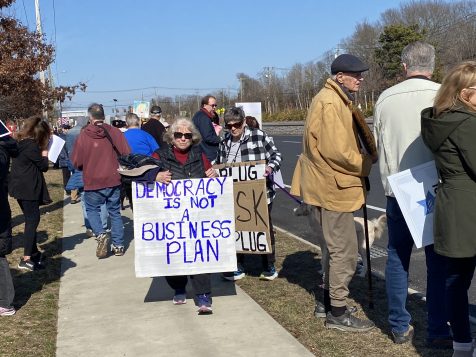
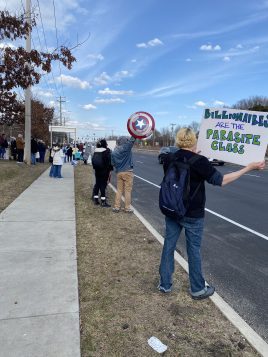


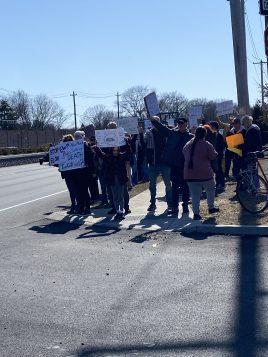

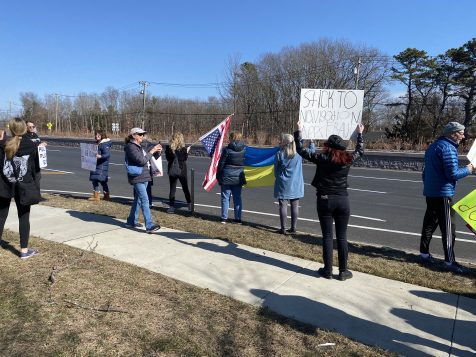




 Geraldine Ferraro: Paving the Way is a feature-length documentary about the life of the trailblazing woman who made history in 1984 as the first female Vice Presidential nominee on a major national party Presidential ticket.
Geraldine Ferraro: Paving the Way is a feature-length documentary about the life of the trailblazing woman who made history in 1984 as the first female Vice Presidential nominee on a major national party Presidential ticket.


